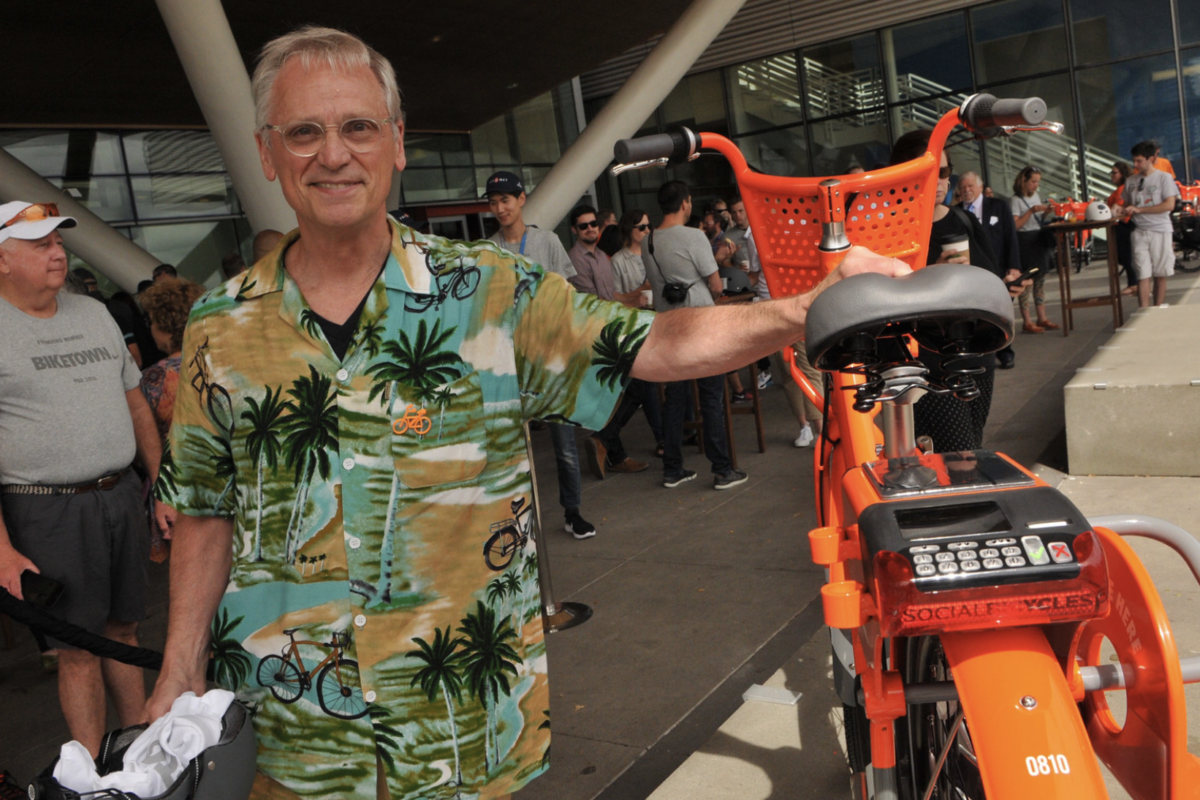
“I don’t want to sound like ‘Johnny-one-note’ with our cycling agenda, but burning calories instead of fossil fuel is something that will make a difference right now.”
-Earl Blumenauer
Thanks to inflation and the war in Ukraine, gas prices have hit record highs, and in the car-dependent United States, a lot of people across the political spectrum are unhappy.
But instead of using this as a wake-up call to shift toward low-car transportation and loosen the Americans’ grip on their steering wheels, many local and national officials have proposed band-aid policies to make gas cheaper. Recently, President Joe Biden announced a proposal to temporarily lift the federal gas tax – about 18 cents per gallon for regular gasoline – to lighten the financial burden for Americans who drive petrol-powered cars.
But this idea has not been very well-received. Critics say it’s a political gimmick at best. At worst, it’s outright climate arson to continue encouraging people to drive gas vehicles.
One of these detractors has been Earl Blumenauer, the U.S. Representative from Oregon who represents most of Portland east of the Willamette River. In a June 16th letter to Biden, Blumenauer urged the President to seek alternate solutions.
“While there is undoubtedly a need to provide American consumers relief from spiking costs, there is no guarantee a gas tax suspension would reduce prices at the pump or stem the broader inflation affecting the global economy, and it may only increase oil companies’ bottom lines,” Blumenauer wrote. “Suspending the federal gas tax would not lower prices for consumers, and would not have the desired political effect; it also would seriously damage important policy opportunities, and should be rejected by your administration.”
I spoke with the Congressman on the phone Monday morning and asked him to elaborate on what he thinks about the future of transportation policy given the political temperature in D.C. and the bipartisan fixation on ‘pain at the pump.’ One thing Blumenauer (who is the co-chair of the informal U.S. Congressional Bike Caucus, by the way) thinks would help? Bikes.
“One of the things we routinely emphasize is there are things we can do that would cost a fraction of this and would actually help people,” Blumenauer told me. “I don’t want to sound like ‘Johnny-one-note’ with our cycling agenda, but burning calories instead of fossil fuel is something that will make a difference right now.”
For the last year and a half, Blumenauer has been trying to use infrastructure talks to propel bike legislation, specifically with a bill to make electric bikes more affordable as a way to reduce car dependency.
“Electric bikes can transform even nominal cyclists into bike commuters. It really makes a difference.”
“Electric bikes can transform even nominal cyclists into bike commuters,” Blumenauer says. (We concur.) “It really makes a difference.”
One particularly troublesome element of the gas rebate discussion is how it ignores the fact that many lower-income Americans don’t drive cars. They need better active and public transportation infrastructure, not prepaid gas credit cards. Blumenauer agrees these people have been left out.
“Low income people and people of color are heavily transit-dependent. But [gas tax holiday proposals indicate] we shouldn’t be as concerned with them as we are with the suburban single-occupant vehicle commuter. It’s not rational, and it’s not fair,” he says. “It’s been really frustrating they don’t get the they don’t get the same attention.”
At this point, it seems unlikely Biden will be able to shore up support for a federal gas tax holiday. But several state governments, including in states with liberal governors, are going for it. And just the fact that it’s on Biden’s radar at all is cause for concern.
Even with these disappointing trends, however, Blumenauer appears hopeful for progress in the future. While bold transportation infrastructure investment may seem like a lost cause should Democrats lose control of Congress in the fall, Blumenauer says he still trusts Biden’s administration and Transportation Secretary Pete Buttigieg to make moves.
“Working with federal, state and local agencies, we can have a profound influence, regardless of the outcome of the midterm elections,” he says.
Blumenauer points out the transportation provisions in the $1.2 trillion infrastructure bill passed last year, acknowledging it’s only a “modest breakthrough” (advocates say it may actually increase carbon emissions) but that some of its funding will help fund active transportation projects across the country. He also says he is seeing a cultural paradigm shift against freeway expansions, including in very car-centric communities like Phoenix and Los Angeles. (Check out the Freeway Fighters Network map to see other places – including Portland – where this battle is playing out.)
Blumenauer says he sees Portland projects like the 82nd Avenue jurisdictional transfer, the plan to expand the Streetcar to the Northwest Industrial District and the upcoming bike and pedestrian bridge with his namesake as indicative of progress here that could be replicated elsewhere. And he says he and the ‘bike constituency’ (which includes other active transportation activists) aren’t going anywhere.
“Communities all over the country are struggling with the same challenges. A more diverse set of low-carbon transportation alternatives – with less reliance on single-occupant vehicles and more on bikes, pedestrian and transit – is key to success,” Blumenauer says. “We’re in it for the long haul.”



